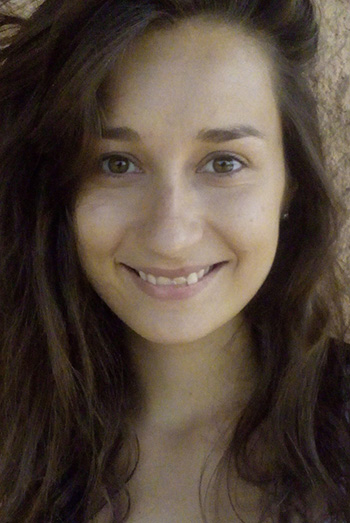
Tess Gagnage
Tess Gagnage has embarked on a fascinating study of Polish persecution of Jews before and during the Holocaust through the lens of French-language survivor testimony in the Visual History Archive.
Gagnage is a master’s candidate in contemporary history at ENS Lyon, which became the first Visual History Archive full access site in France in 2014. Through the Institute’s French liaison Emmanuel Debono, Gagnage learned of the Visual History Archive and decided to conduct her own study of the testimonies.
For the past year, her first year of research, Gagnage focused on what French-language Holocaust survivors and witnesses say about the Polish population’s involvement in Jewish persecution between World Wars I and II and during World War II. She viewed testimonies in the Visual History Archive as well as the National Audiovisual Institute of France, watching over 100 full testimonies before conducting a precise analysis of the language of individual testimonies.
“These testimonies allowed me to access, with special interest, the witnesses’ words in the most direct and, to me, the most authentic way,” Gagnage said.
Through her research, she has found that the French-language Jewish survivors and witnesses are indeed very critical of Polish involvement in the persecution of Polish Jews – a subject that has long been taboo in Poland. They remember all too well how the Polish population pillaged from Jewish families and how the police abused and discriminated against Jews, Gagnage said.
She also looked at Polish resistance and how some witnesses remember having benefitted from Polish rescuers, as well as the different attitudes witnesses portrayed while speaking about their experiences. She found that people from working-class and rural backgrounds took a more severe, bitter stance toward survivors who were more economically privileged, since they were more likely to have received aid.
“A part of my work therefore consisted of analyzing the construction and reconstruction of memories and of survivor memorial discourse,” she said.
These findings are important to Gagnage because Polish antisemitism and the participation of Polish people in Jewish persecution during World War II is a subject that has long been silenced in post-war Poland. It was interesting to see how survivors’ answers to questions about this topic demonstrate the discrepancy between Poland’s “official memory” and the memories lived by the survivors themselves.
She said that testimony allows researchers to gain an accurate and nuanced understanding of history that is not affected by modern reconstructions of the past.
“For me, testimony is an absolutely unavoidable source for all researchers and students who are interested like myself in issues of memory and of representation and fit into the crucible of a history of mindsets,” Gagnage said. “It lends the possibility of working towards a closer sensibility, an intimacy, a subjectivity that cannot be concealed within the framework of reflection like ours.”